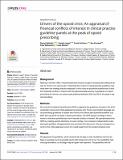Drivers of the opioid crisis : An appraisal of financial conflicts of interest in clinical practice guideline panels at the peak of opioid prescribing
Date
24/01/2020Metadata
Show full item recordAbstract
BACKGROUND: Starting in the late 1990s, the pharmaceutical industry sought to increase prescribing of opioids for chronic non-cancer pain. Influencing the content of clinical practice guidelines may have been one strategy industry employed. In this study we assessed potential risk of bias from financial conflicts of interest with the pharmaceutical industry in guidelines for opioid prescribing for chronic non-cancer pain published between 2007 and 2013, the peak of opioid prescribing. METHODS: We used the Guideline Panel Review (GPR) to appraise the guidelines included in the 2014 systematic review and critical appraisal by Nuckols et al. These were English language opioid prescribing guidelines for adults with chronic non-cancer pain published between July 2007 and July 2013, the peak of opioid prescribing. The GPR assigns red flags to items known to introduce potential bias from financial conflicts of interest. We operationalized the GPR by creating specific definitions for each red flag. Two reviewers independently evaluated each guideline. Disagreements were resolved with discussion. We also compared our score to the critical appraisal scores for overall quality from the study by Nuckols et al. RESULTS: We appraised 13 guidelines, which received 43 red flags in total. Guidelines had 3.3 red flags on average (out of a possible seven) with range from one to six. Four guidelines had missing information, so red flags may be higher than reported. The guidelines with the highest and second highest scores for overall quality in the 2014 critical appraisal by Nuckols et al. had five and three red flags, respectively. CONCLUSION: Our findings reveal that the guidelines for opioid prescribing chronic non-cancer pain from 2007 to 2013 were at risk of bias because of pervasive conflicts of interest with the pharmaceutical industry and a paucity of mechanisms to address bias. Even highly-rated guidelines examined in a 2014 systematic review and critical appraisal had many red flags.
Citation
Spithoff , S , Leece , P , Sullivan , F , Persaud , N , Belesiotis , P & Steiner , L 2020 , ' Drivers of the opioid crisis : An appraisal of financial conflicts of interest in clinical practice guideline panels at the peak of opioid prescribing ' , PLoS ONE , vol. 15 , no. 1 , e0227045 . https://doi.org/10.1371/journal.pone.0227045
Publication
PLoS ONE
Status
Peer reviewed
ISSN
1932-6203Type
Journal article
Collections
Items in the St Andrews Research Repository are protected by copyright, with all rights reserved, unless otherwise indicated.

